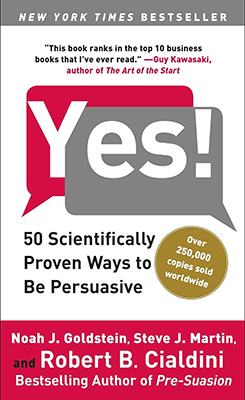Yes! 50 Scientifically Proven Ways To Be Persuasive
“Yes! 50 Scientifically Proven Ways to Be Persuasive” by Robert B. Cialdini, Noah J. Goldstein, and Steve J. Martin is a book that delves into the psychology of persuasion and provides actionable insights based on scientific research. Here’s a summary of its key points:
- Reciprocity: The authors discuss the principle of reciprocity, which suggests that people feel obliged to repay others for what they have received. They provide strategies for leveraging reciprocity, such as offering free samples or gifts before making a request.
- Scarcity: The book explores how scarcity can influence decision-making by making something seem more valuable or desirable. The authors offer techniques for creating a sense of scarcity, such as highlighting limited quantities or time-sensitive offers.
- Authority: Cialdini and his co-authors discuss the power of authority in influencing behavior. They provide examples of how people are more likely to comply with requests from perceived experts or figures of authority.
- Consistency: The authors explore the principle of consistency, which suggests that people tend to behave in ways that are consistent with their past actions or commitments. They offer strategies for getting others to commit to a small action or statement, which can increase the likelihood of future compliance.
- Liking: The book discusses the importance of likability in persuasion. The authors explain how people are more likely to be persuaded by those they like and provide techniques for building rapport and fostering positive relationships.
- Social Proof: Cialdini and his co-authors examine the principle of social proof, which suggests that people are influenced by the actions and behaviors of others. They offer strategies for using social proof to influence behavior, such as highlighting testimonials or demonstrating widespread adoption.
- Consensus: The authors discuss the concept of consensus, which suggests that people are more likely to take action if they believe it is consistent with the behavior of others. They provide techniques for creating consensus, such as highlighting the popularity of a product or service.
- Emotional Appeals: Finally, the book explores the power of emotional appeals in persuasion. The authors discuss how emotions can influence decision-making and provide strategies for eliciting specific emotional responses to increase persuasion.
Overall, “50 Scientifically Proven Ways to Be Persuasive” offers a comprehensive overview of the principles of persuasion and provides practical techniques for applying them in various contexts. Whether you’re a marketer, salesperson, or simply looking to improve your ability to influence others, the book offers valuable insights based on rigorous scientific research.

